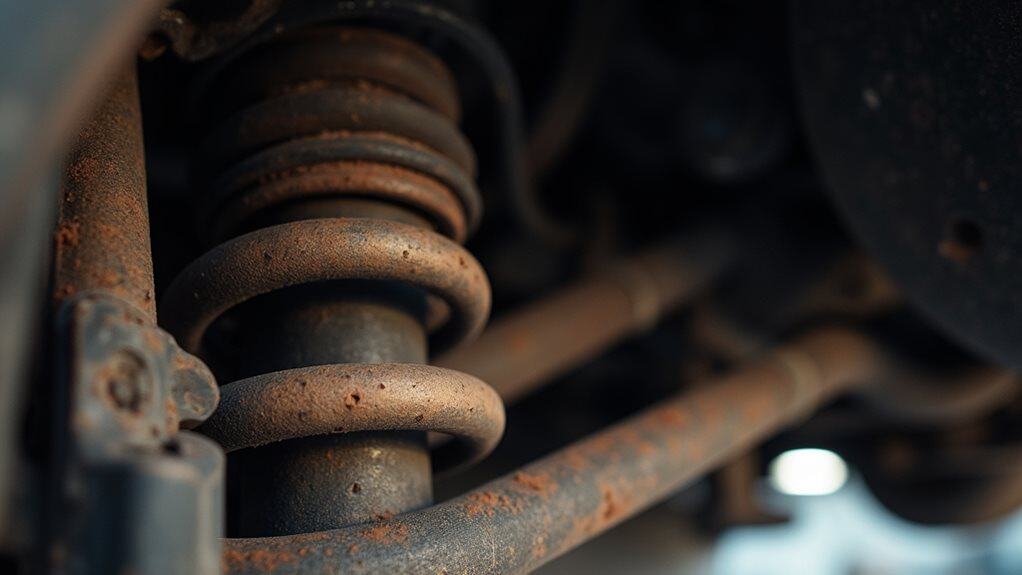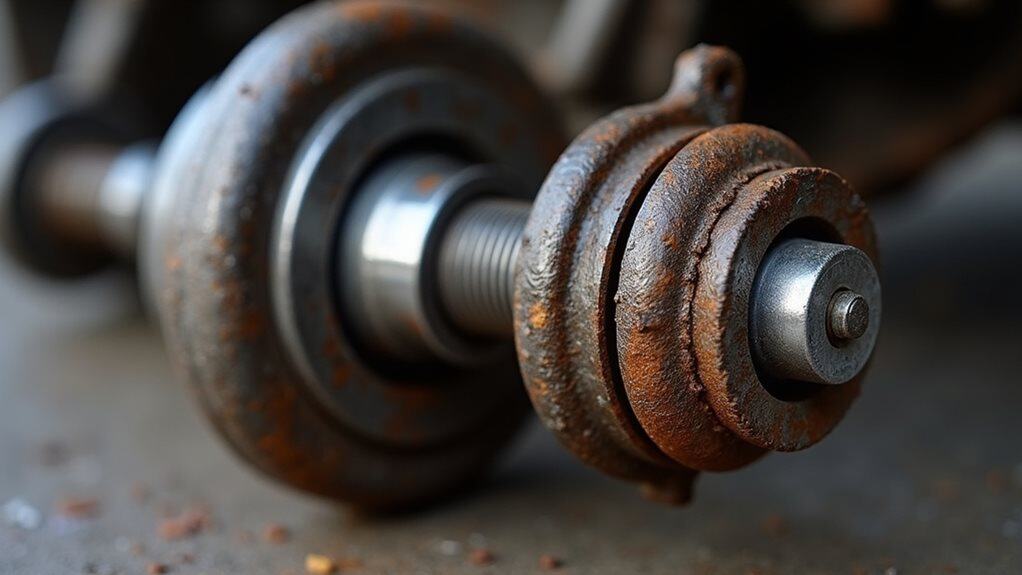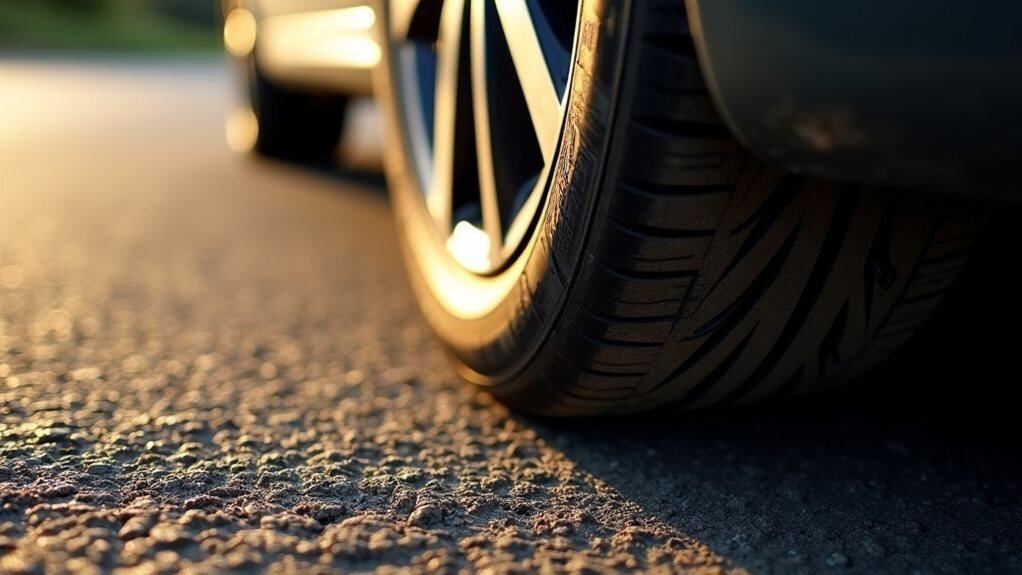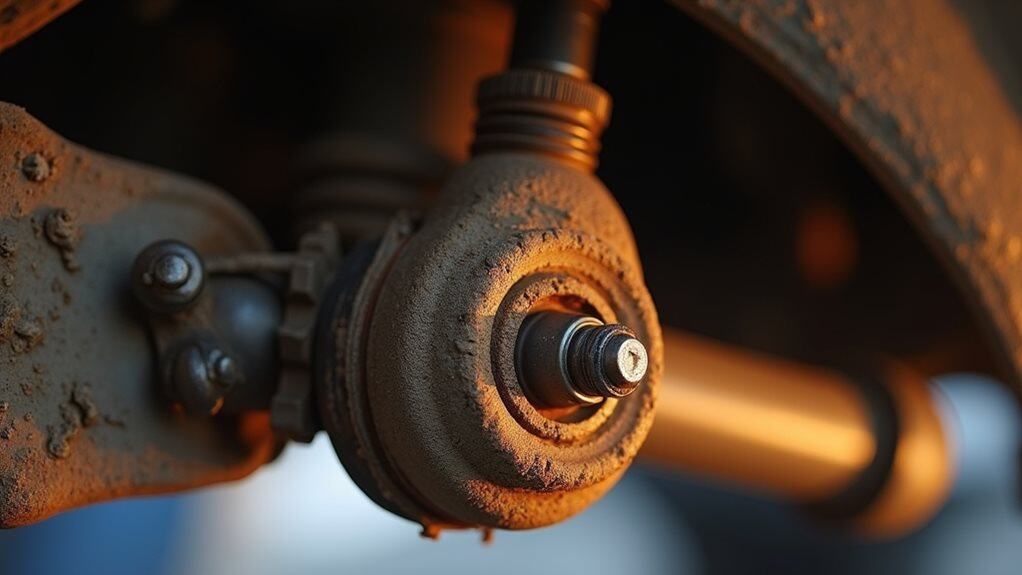A single pop sound when turning your vehicle likely indicates a problem with your steering or suspension components. Common culprits include worn ball joints, damaged strut mounts, failing CV joints, or deteriorating control arm bushings. These issues can compromise your vehicle’s handling and safety during turns or emergency maneuvers. While tire pressure problems may cause similar sounds, it’s essential to have a professional mechanic inspect your vehicle. Understanding the specific cause will help you prevent more severe mechanical issues.
Quick Tips
- Worn ball joints connecting steering knuckles to control arms often create a single popping noise during turns.
- Failed strut mounts can produce an isolated pop sound when turning, especially at lower speeds.
- A damaged CV joint commonly causes a single pop when turning, indicating compromised wheel power transfer.
- Loose or worn control arm bushings frequently create a distinct pop noise during steering maneuvers.
- A single pop could indicate a loose component in the steering column requiring immediate professional inspection.
Understanding Pop Sounds in Your Vehicle

When you hear a distinct pop sound while turning your vehicle, it’s important to understand that this noise isn’t just a random occurrence but often indicates a specific mechanical issue that needs attention.
The popping can stem from various causes, including exhaust system problems, incorrect fuel mixtures, or engine timing issues. A malfunctioning speed sensor can also contribute to erratic engine performance, which may lead to unusual sounds while driving. Your vehicle’s pops might also result from worn spark plugs or a dirty air filter affecting engine performance. A concerning sign is hearing noises specifically while driving over bumps or turning corners.
Common Causes of Steering Pop Noises
Because your vehicle’s steering system consists of numerous interconnected components, a mysterious pop sound while turning often signals an underlying mechanical issue that requires attention.
The most common culprits include worn steering components, damaged strut mounts, failed control arm bushings, or loose parts in your steering column. Worn ball joints are particularly prone to making sharp clunking noises during turns. Regular inspection of wheel bearings and ball joints can help prevent these issues from escalating into more serious problems.
A single pop when turning typically indicates that one of these components needs inspection or replacement.
The Role of CV Joints and Ball Joints

Two critical components in your vehicle’s steering system – CV joints and ball joints – play distinct roles in creating smooth, controlled turns.
CV joints allow your wheels to flex while maintaining power transfer, while ball joints connect your steering knuckles to control arms.
When either component wears out, you’ll hear popping noises during turns, which can lead to reduced maneuverability and uneven tire wear. Regular inspections of CV joints are essential to catch potential issues early and ensure safe driving.
How Suspension Components Affect Turning
Since your vehicle’s suspension system plays an essential role in turning performance, understanding its components can help you identify and prevent potential issues.
Your springs and shocks work together to absorb bumps and maintain stability, while bushings cushion joints during movement.
The stabilizer bars prevent excessive leaning in turns, and ball joints guarantee proper wheel alignment and steering control. Additionally, worn or damaged ball joints can lead to significant steering difficulties, emphasizing the importance of regular inspections.
When Tire Pressure Creates Popping Sounds

While suspension components affect your vehicle’s turning ability, tire pressure plays an equally significant role in preventing unwanted noises during turns.
If you’re hearing a single pop when turning, it could be due to trapped air under your tire’s tread, especially if your tires are underinflated.
Regular pressure checks are vital, as underinflation increases friction and heat, potentially leading to tire failure.
Safety Implications of Steering Pop Noises
Understanding the safety implications of steering pop noises can make the difference between a minor repair and a serious accident.
When you hear these sounds, they’re often warning signs of failing suspension or steering components.
You’re at risk of compromised vehicle control, especially during turns or emergency maneuvers.
Don’t ignore these noises, as they can lead to unstable handling and potential accidents.
Diagnosing the Source of the Pop

To pinpoint the source of your car’s pop noise, you’ll need to check specific locations while the vehicle is safely raised on jack stands.
When testing, turn your steering wheel slowly from lock to lock while listening carefully for the pop sound’s exact location, which will help narrow down whether it’s coming from the CV joints, ball joints, or control arm area.
You can also have someone else turn the wheel while you use a mechanic’s stethoscope or even a long screwdriver (placed against your ear) to isolate the sound’s precise origin.
Location During Vehicle Inspection
Four key locations require careful inspection when diagnosing a pop sound during vehicle turns.
Start by examining the front suspension components, particularly the struts and CV joints.
Next, check the steering system’s tie rod ends and ball joints.
You’ll also want to inspect the suspension bushings throughout the vehicle, and finally, examine the exhaust system for any loose connections.
Simple DIY Testing Methods
Once you’ve identified the key inspection points, several straightforward testing methods can help pinpoint the exact source of that mysterious pop sound.
You’ll want to use your ears strategically while turning the steering wheel slowly, noting exactly when the pop occurs.
Using a basic microphone or smartphone’s audio recording feature, you can document the sound’s characteristics for more precise diagnosis.
Essential Maintenance Tips to Prevent Popping
You’ll need to check your tire pressure at least monthly to prevent uneven wear that can lead to popping sounds during turns.
By lubricating your vehicle’s moving parts, especially CV joints and ball joints, you’re creating a protective barrier that reduces friction and wear on these essential components.
Make it a habit to inspect your suspension components every three months, looking for signs of wear or damage that could develop into noise-causing problems if left unchecked.
Regular Tire Pressure Checks
Maintaining proper tire pressure through regular checks stands as one of the most critical yet often overlooked aspects of vehicle maintenance.
You’ll want to check your tire pressure at least monthly, using a reliable pressure gauge to guarantee readings between 28-36 PSI.
Proper inflation not only prevents unusual noises but also improves safety, extends tire life, and enhances fuel efficiency.
Lubricate Moving Parts Monthly
Regularly lubricating your vehicle’s moving parts serves as a fundamental defense against unwanted popping sounds and mechanical wear.
Focus on critical areas like door hinges, hood latches, and trunk mechanisms each month.
Don’t forget your steering components and wheel bearings, as they’re especially prone to making popping noises when turning.
Apply appropriate lubricants to these parts to guarantee smooth, quiet operation.
Inspect Suspension Components Quarterly
Four critical suspension components require thorough inspection every three months to prevent those frustrating popping sounds while turning.
You’ll need to examine your control arms and ball joints for excessive play, check bushings for signs of deterioration, inspect shocks and struts for leaks or damage, and verify your springs aren’t sagging or showing unusual wear patterns.
Professional Repair Options and Costs
When facing a persistent popping sound while turning, professional repair costs can vary considerably based on the specific component that’s failing.
You’ll typically spend $100-500 for CV joint replacement, $50-200 for each strut mount, and similar ranges for ball joints.
Control arm bushing repairs are generally more affordable, running $50-200 including labor, while steering system repairs fluctuate based on complexity.
Wrapping Up
Don’t ignore that popping sound when you turn your vehicle – it’s your car telling you something needs attention. Whether it’s worn CV joints, problematic ball joints, or suspension issues, addressing the problem early can prevent more expensive repairs down the road. Schedule an inspection with a qualified mechanic, who’ll diagnose the exact cause and recommend appropriate repairs to keep you safe and your vehicle running smoothly.

